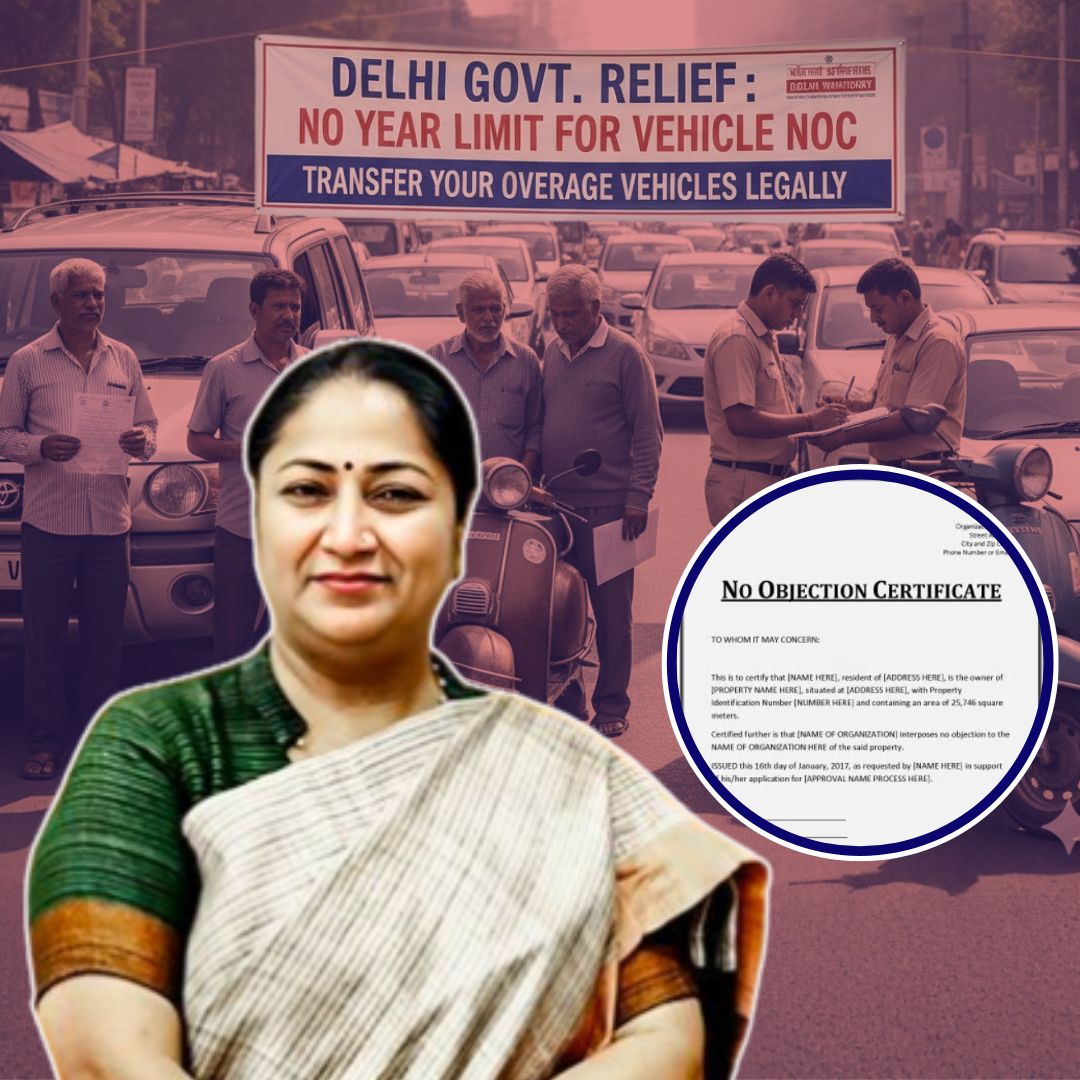In a significant development for vehicle owners in Delhi, the Delhi government recently announced the removal of the one-year limit on applications for No Objection Certificates (NOCs) for deregistered vehicles.
This progressive policy change aims to provide relief to lakhs of owners of overage petrol and diesel vehicles, allowing them to legally transfer or re-register these vehicles outside the Delhi-NCR region regardless of how long ago their registration expired.
The decision reflects a balance between environmental responsibility and administrative fairness, addressing longstanding procedural hurdles and contributing to the government’s efforts to reduce pollution and congestion in the national capital.
Relief for Overage Vehicle Owners
Earlier, the Delhi government’s “Guidelines for Handling End of Life Vehicles in Public Places of Delhi, 2024” restricted the application for NOCs to within one year after a vehicle’s registration expired following its age limit-10 years for diesel and 15 years for petrol vehicles.
This deadline often left many vehicle owners unable to apply for NOCs, resulting in vehicles stranded in Delhi with no legal means to transfer or dispose of them. As explained by Delhi Transport Minister Pankaj Kumar Singh, this created “an unintended logjam” with lakhs of vehicles stuck, neither scrapped nor moved out, escalating pollution and traffic congestion in the city.
By suspending this restrictive clause, the government now enables owners to apply for NOCs at any time after deregistration, irrespective of the time elapsed since the registration expiry. “This move empowers citizens to make responsible choices,” Minister Singh stated, noting that it will systematically phase out old vehicles from Delhi’s roads.
Owners of diesel vehicles older than 10 years and petrol vehicles older than 15 years can now legally transfer these vehicles to states where they’re permitted, thereby removing them from Delhi’s ecosystem and contributing to cleaner air and decongestion.
Legal and Environmental Backdrop
The policy change responds to the legal framework shaped by multiple rulings aimed at improving Delhi’s air quality. A 2018 Supreme Court order bans diesel vehicles older than 10 years and petrol vehicles older than 15 years from operating within Delhi.
Additionally, the National Green Tribunal’s 2014 directive prohibits the use of vehicles over 15 years old in public spaces in the capital. These measures underscore Delhi’s commitment to curbing pollution caused by outdated vehicles.
However, while the environmental mandates are strict, the rigid one-year cap on NOC applications complicated compliance, leading to calls from citizens, automobile dealers, and transport associations for more flexible rules. Many vehicle owners faced difficulties in navigating bureaucratic delays or missed deadlines, leaving numerous vehicles illegally parked or abandoned, inadvertently exacerbating pollution and urban congestion problems.
The relaxation of the deadline thus results from extensive public representations and government internal reviews, reflecting a more humane approach to policy while upholding environmental priorities.
Implementation and Wider Impact
The government has moved quickly to implement this change following its announcement on October 30, 2025. Transport officials have emphasised that while the deadline for NOC applications has been lifted, the ban on the use of overage vehicles within Delhi remains firmly in place.
The updated framework allows these vehicles to be scrapped or re-registered only in other states. This process ensures coordinated phasing out of end-of-life vehicles from Delhi, helping to maintain ongoing air quality improvement efforts.
Experts suggest that the change will encourage owners to dispose of or shift older vehicles responsibly instead of abandoning them or using them illegally. This could significantly reduce congestion caused by idle vehicles and improve the regulatory system’s responsiveness to citizens’ needs.
Moreover, by promoting transfer and recycling outside Delhi, it aligns with circular economy principles and sustainable urban management.
The Logical Indian’s Perspective
The removal of the one-year limit on NOC applications is a thoughtful and pragmatic policy that upholds both the rights of citizens and environmental concerns. It transforms a rigid regulatory barrier-one that risked penalising well-meaning citizens and complicating administrative processes-into an enabling reform promoting fairness and sustainability.
The Delhi government’s decision reflects the values of compassionate governance, striking a careful balance between environmental stewardship and ease of compliance. By advancing such inclusive policies, authorities encourage collaboration among citizens, environmentalists, and the administration to tackle complex urban challenges.











